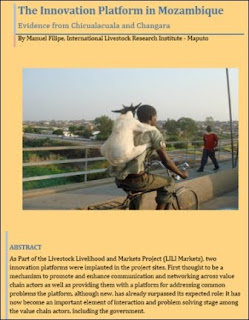Value chain analysis has important applications in development settings but research gaps exist in quantifying the impacts from value chain interventions. Various quantitative methods exist that have the potential to strengthen measurement of value chain impacts.
A new study published online on 18 December 2010 in the journal Food Policy examines the application of two modelling platforms, system dynamics and agent-based modelling, in quantitative value chain analysis of livestock systems within a developing-country context.
The paper, Quantifying value chain analysis in the context of livestock systems in developing countries, is authored by Karl Rich of the Norwegian Institute of International Affairs (NUPI) and on joint appointment at the International Livestock Research Institute (ILRI), R Brent Ross of Michigan State University, Derek Baker of ILRI and Asfaw Negassa of the International Maize and Wheat Improvement Center (CIMMYT).
View the abstract here
Citation
Rich KM, Ross RB, Baker AD and Negassa A. 2011.Quantifying value chain analysis in the context of livestock systems in developing countries. Food Policy 36(2): 214-222.
A new study published online on 18 December 2010 in the journal Food Policy examines the application of two modelling platforms, system dynamics and agent-based modelling, in quantitative value chain analysis of livestock systems within a developing-country context.
The paper, Quantifying value chain analysis in the context of livestock systems in developing countries, is authored by Karl Rich of the Norwegian Institute of International Affairs (NUPI) and on joint appointment at the International Livestock Research Institute (ILRI), R Brent Ross of Michigan State University, Derek Baker of ILRI and Asfaw Negassa of the International Maize and Wheat Improvement Center (CIMMYT).
View the abstract here
Citation
Rich KM, Ross RB, Baker AD and Negassa A. 2011.Quantifying value chain analysis in the context of livestock systems in developing countries. Food Policy 36(2): 214-222.










